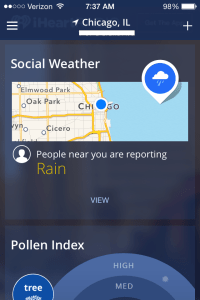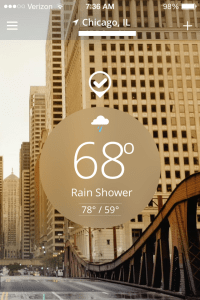Like thousands of people, I use the Weather Channel app for iPhone. This morning, my Weather Channel app looked like this when I opened it:
A concise summary of the current weather, with a rotating picture of Chicago as the backdrop. Nice.
Recently, the Weather Channel app introduced a feature called “Social Weather.” At the same time this morning, it looked like this:

The introduction of Social Weather creates a few scenarios, and none of them are positive. For example:
Scenario #1: The Weather Channel says it’s raining. Social Weather says it’s not raining. I go outside, and it is in fact raining. I am left to wonder what is wrong with either Social Weather or my fellow Chicagoans.
Scenario #2: The Weather Channel says it’s raining. Social Weather says it’s not raining. I go outside, and it is not raining. The Weather Channel has successfully undermined its own credibility.
Scenario #3: The Weather Channel says it’s raining. Social Weather also says it’s raining. What exactly has Social Weather added to the conversation?
In other words, Social Weather creates outcomes that range only from useless to negative.
Of course, Social Weather can’t give you what the Weather Channel should be giving you, and that’s accurate forecasting. I usually don’t turn to handsomely-paid meteorologists to tell me what’s happening right now; for this, I recommend a centuries-old “life hack” called “looking out the window.” I need them to tell me what will happen in the next few hours or the next few days.
“Social Weather” is free as part of the app, but it’s not free to the Weather Channel. There’s an operational cost of including this feature. Adding to your cost structure, without providing an offsetting benefit, is what you might call bad business.
Maybe this is a feeble attempt at creating engagement. But I can’t imagine anyone getting too excited about anonymously reporting the weather. (The screen-grab below, also from this morning, suggests that a single Chicagoan in my vicinity used Social Weather.)
Sure, Social Weather isn’t hurting anyone. But it’s not helping anyone either. The moral:
In social and in branding, if it doesn’t add value or meaning, it’s clutter. And clutter belongs on the chopping block.
About Matthew Fenton: Matthew helps challenger brands to focus, grow and win. Since founding his consultancy, Three Deuce Branding, in 1997, he’s helped hundreds of brands to achieve “brand clarity.” His consulting services and speaking engagements help brands to focus on what matters through positioning, strategy and ideation. Contact Matthew here. He calls Chicago home.
Copyright 2014 – Matthew Fenton. All Rights Reserved. You may reprint this article with the original, unedited text intact, including the About Matthew Fenton section.




Two thumbs up. Very sound advice. Makes me want to stop hoarding…